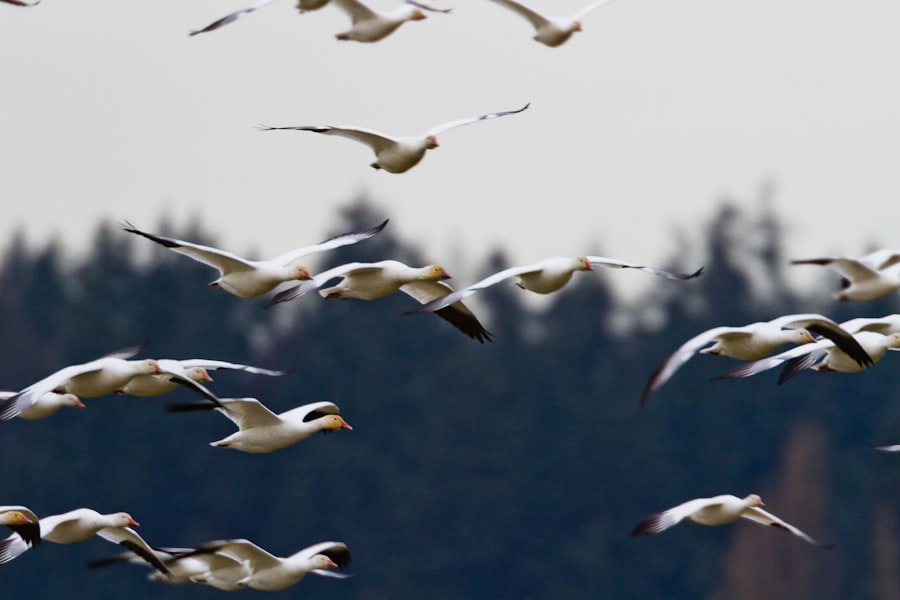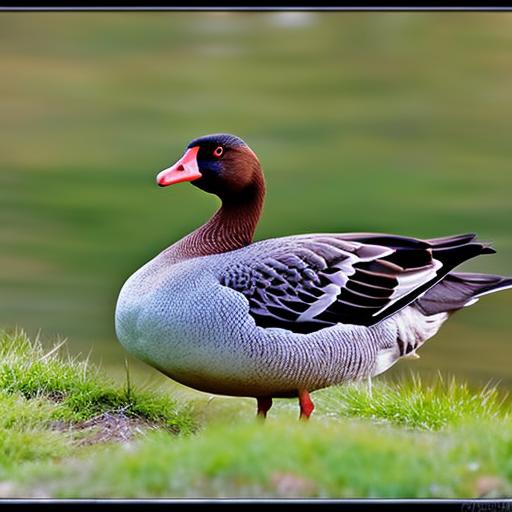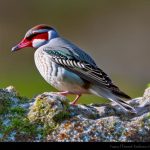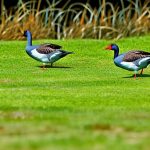Geese can be a beautiful sight to behold, with their graceful flight and elegant appearance. However, when they invade your property in large numbers, they can quickly become a nuisance. Geese are known for their aggressive behavior, excessive noise, and the mess they leave behind. They can damage lawns, gardens, and even pose a threat to human safety.
Finding humane solutions to deal with geese is important because these birds are protected by federal and state laws. It is illegal to harm or kill geese without proper permits. Therefore, it is crucial to find effective and humane ways to deter geese from your property without causing harm to them.
Key Takeaways
- Geese are social animals and tend to return to the same location year after year.
- Physical barriers such as fences or netting can prevent geese from accessing certain areas.
- Repellents such as taste or scent deterrents can be effective in deterring geese.
- Loud noises such as air horns or banging pots can scare geese away.
- Decoys such as fake predators or other geese can trick geese into thinking an area is unsafe.
- Limiting food sources and maintaining a clean property can discourage geese from staying in the area.
- Planting deterrents such as tall grass or thorny bushes can make an area less attractive to geese.
- Seeking professional help from wildlife control experts can be necessary for large or persistent goose problems.
- Consistent use of multiple deterrent methods is key to effectively managing geese on your property.
Understanding the behavior of geese
To effectively deter geese from your property, it is essential to understand their behavior and what attracts them in the first place. Geese are attracted to areas that provide easy access to food, water, and shelter. They are also social animals that prefer open spaces with good visibility.
Geese are herbivores and feed on grass, grains, and aquatic plants. They are particularly attracted to well-maintained lawns and golf courses that provide ample grazing opportunities. Geese also prefer areas near water bodies such as ponds or lakes where they can find food and water.
Understanding these behaviors can help you identify the areas on your property that may be attracting geese. By addressing these attractants, you can effectively deter geese from staying on your property.
Creating physical barriers
One of the most effective ways to keep geese away from your property is by creating physical barriers that prevent them from accessing certain areas. There are several types of physical barriers that can be used, each with its own pros and cons.
Fencing is a common method used to keep geese out of specific areas. A sturdy fence with small gaps can effectively prevent geese from entering your property. However, it can be expensive to install and may not be aesthetically pleasing.
Another option is the use of netting or wire mesh to cover areas where geese are likely to graze. This can be an effective way to protect lawns and gardens from geese. However, it may require regular maintenance to ensure that the netting or wire mesh remains intact.
Floating barriers can also be used in bodies of water to prevent geese from accessing certain areas. These barriers create a physical barrier that prevents geese from landing or swimming in specific areas. However, they may not be suitable for all types of water bodies and may require regular maintenance.
Using repellents
Repellents can be an effective way to deter geese from your property. There are several types of repellents available, each with its own pros and cons.
Chemical repellents can be applied to grass or other areas where geese are likely to graze. These repellents emit an odor that is unpleasant to geese, causing them to avoid the treated areas. However, chemical repellents may not be suitable for all environments and may require regular reapplication.
Visual repellents, such as scarecrows or reflective tape, can also be used to deter geese. These visual deterrents create a sense of danger or unfamiliarity for the geese, causing them to avoid the area. However, visual repellents may lose their effectiveness over time as geese become accustomed to them.
Acoustic repellents, such as noise-making devices or predator calls, can also be used to scare geese away. These repellents create loud noises or mimic the sounds of predators, causing geese to flee the area. However, acoustic repellents may not be suitable for all environments and may cause disturbance to humans or other wildlife.
Scaring geese away with noise
Scaring geese away with noise can be an effective and humane way to deter them from your property. There are several types of noise-making devices that can be used, each with its own pros and cons.
Propane cannons or bird bangers are commonly used to scare geese away with loud noises. These devices emit loud bangs or explosions at regular intervals, creating a sense of danger for the geese. However, they can be disruptive to humans and may not be suitable for all environments.
Ultrasonic devices emit high-frequency sounds that are unpleasant to geese but inaudible to humans. These devices can be effective in deterring geese without causing disturbance to humans. However, they may not be suitable for all environments and may require regular maintenance.
Another option is the use of predator calls or distress calls to scare geese away. These calls mimic the sounds of predators or distressed geese, causing the geese to flee the area. However, predator calls may not be effective if the geese have become accustomed to them.
Installing decoys

Installing decoys can be an effective way to deter geese from your property. There are several types of decoys that can be used, each with its own pros and cons.
Visual decoys, such as plastic owls or coyotes, can create a sense of danger or unfamiliarity for the geese, causing them to avoid the area. These decoys should be moved regularly to maintain their effectiveness. However, visual decoys may lose their effectiveness over time as geese become accustomed to them.
Motion-activated decoys, such as spinning or flapping devices, can also be used to deter geese. These decoys create movement that mimics the presence of predators or other threats, causing the geese to avoid the area. However, motion-activated decoys may require regular maintenance and may not be suitable for all environments.
Limiting food sources
Limiting food sources is an important step in deterring geese from your property. Geese are attracted to areas that provide easy access to food, so by limiting their food sources, you can discourage them from staying on your property.
One way to limit food sources is by removing or reducing the amount of grass or other vegetation that geese feed on. This can be done by mowing lawns regularly or planting alternative ground covers that are less attractive to geese.
Another option is to use deterrents, such as taste repellents, on grass or other areas where geese are likely to graze. These repellents make the grass or vegetation taste unpleasant to geese, causing them to avoid the area.
Maintaining a clean property
Maintaining a clean property is another important step in deterring geese from your property. Geese are attracted to areas that provide easy access to water and shelter, so by maintaining a clean property, you can discourage them from staying on your property.
Regularly cleaning up any spilled food or garbage can help reduce the attractiveness of your property to geese. It is also important to remove any standing water or puddles that may attract geese.
Planting deterrents
Planting deterrents can be an effective way to deter geese from your property. There are several types of plants that can be used, each with its own pros and cons.
Tall grasses or shrubs can create physical barriers that make it difficult for geese to access certain areas. These plants provide cover and make it less attractive for geese to land or graze.
Plants with strong scents, such as lavender or rosemary, can also deter geese. The strong scents are unpleasant to geese and can discourage them from staying on your property.
Seeking professional help
If the problem persists despite your best efforts, it may be necessary to seek professional help. There are several types of professionals that can assist in deterring geese from your property.
Wildlife control experts can provide advice and assistance in implementing effective deterrent strategies. They can also help with the removal of geese if necessary.
Landscaping professionals can provide guidance on planting deterrents and maintaining a clean property to discourage geese.
Being proactive and consistent
To effectively deter geese from your property, it is important to be proactive and consistent in implementing the solutions. Geese are persistent animals, so it may take time and effort to successfully deter them.
Regularly inspecting your property for attractants and implementing deterrent strategies can help prevent geese from becoming a nuisance. It is also important to consistently maintain a clean property and limit food sources to discourage geese from staying on your property.
In conclusion, dealing with geese can be a challenging task, but with the right strategies, it is possible to deter them from your property in a humane manner. Understanding the behavior of geese and addressing their attractants is key to finding effective solutions. Whether it’s creating physical barriers, using repellents, scaring geese away with noise, installing decoys, limiting food sources, maintaining a clean property, planting deterrents, seeking professional help, or being proactive and consistent, there are various options available to deter geese from your property. It is important to find the best solution for your situation and implement it consistently to achieve long-term success in deterring geese.
If you’re looking for effective ways to keep geese off your property, you may also be interested in learning about the best location to place your chicken coop. Poultry Wizard offers a helpful article on “Where to Put Chicken Coop” that provides valuable insights on selecting the ideal spot for your coop. By strategically positioning your coop, you can not only ensure the safety and comfort of your chickens but also deter unwanted visitors like geese. Check out the article here for expert advice on creating a secure and goose-free environment for your poultry.
FAQs
What are some common problems caused by geese on your property?
Geese can cause damage to lawns, gardens, and crops. They can also leave behind large amounts of droppings, which can be unsightly and unsanitary.
Why do geese come onto your property?
Geese are attracted to areas with open water, grassy areas, and food sources. They may also be attracted to areas with little human activity, as they feel safer in these areas.
What are some effective ways to keep geese off your property?
Some effective ways to keep geese off your property include using visual deterrents such as scarecrows or reflective tape, using noise deterrents such as loud noises or predator calls, and using physical barriers such as fences or netting.
Are there any humane ways to keep geese off your property?
Yes, there are several humane ways to keep geese off your property. These include using visual and noise deterrents, as well as using natural repellents such as plants that geese do not like.
Is it legal to harm or kill geese on your property?
In most cases, it is illegal to harm or kill geese on your property. Geese are protected under federal and state laws, and there are strict regulations in place to protect them. It is important to find humane and legal ways to keep geese off your property.
Meet Walter, the feathered-friend fanatic of Florida! Nestled in the sunshine state, Walter struts through life with his feathered companions, clucking his way to happiness. With a coop that’s fancier than a five-star hotel, he’s the Don Juan of the chicken world. When he’s not teaching his hens to do the cha-cha, you’ll find him in a heated debate with his prized rooster, Sir Clucks-a-Lot. Walter’s poultry passion is no yolk; he’s the sunny-side-up guy you never knew you needed in your flock of friends!







